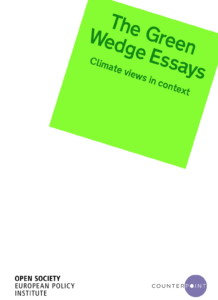These essays from Denmark, Sweden, Germany, Italy, France, Poland, Spain and the Czech Republic give us some clues as to what climate policy-makers need to know in order to act effectively and with agility in very different contexts.
Dealing with potential backlashes against climate policy is set to become a full-time job; so identifying where these might come from or how they might evolve will be crucial. Understanding how one can appeal to Europeans to change their habits all the while protecting their lifestyles and well-being, their favourite landscapes or public squares, but also their political and social institutions — this is the vital work that needs to be tackled.
In our work on climate policy in Europe, we have chosen to take a double approach. First, we wanted to get a sense of what one might think of as the ‘unguarded conversation’ that takes place on social media.
But the social media conversations are also idiosyncratic: they are reflective of particular contexts, a political culture, a media and political landscape, a historical set
of references. It is to make sure that these specificities are granted their proper weight that we commissioned these eight essays. These essay can easily stand alone in their quality and insights, but they go hand in hand with our recent Green Wedge report and – perhaps above all – with our forthcoming country analyses of the social media discussion around the European Green Deal (EGD) and more broadly climate policy.
- One key thing to emerge from these essays and our research is that a solid majority of the public in every country hungers for a different type of good life – whether it is in a loved Italian city, or in rural Denmark, whether it’s about balance or security, health or work.
- Second, divisions between centre and periphery (both geographically and metaphorically – those who feel undervalued feel no less peripheral to our economic and cultural ecosystems) underpin the resentments that have already been voiced. These cleavages will be relentlessly exploited by populists and climate policy detractors; new narratives need to emerge that create a vision that can leapfrog them through bold strokes of our collective imagination by reaching deep into what we value most about our personal, social and national lives, past and present.
- Finally, these essays and their authors exhort us to think of climate policy as everyday life. We are facing a set of deep, radical transformations. The only way to encourage support and consent for policies that are set – and designed – to trans- form every aspect of our lives is to enable citizens to imagine daily life as a set of new opportunities.
This, as each essay makes clear, is about how we imagine and live in a present that we need to create, rather than some distant vision of the future.

